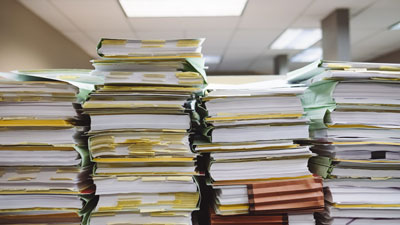
Document retention can be a tricky area to navigate. On the one hand, storage costs money. On the other hand, fines can cost a lot more money.
On the flip side of this, however, you can be fined for keeping documents for too long (if they contain sensitive data).
Added to all of this is the fact that there are relatively few hard-and-fast rules on the matter. It’s more common for there to be guidelines, which you need to interpret. Here is some guidance on how to do so.
Start by working out what documents contain sensitive data
Any document which contains sensitive data is under GDPR (and likely to stay so even after the UK fully leaves the EU). This means that the sensitive data at least must be kept for only as long as is necessary.
After that, the sensitive data must be deleted. You can keep the rest of the document if you need or want to, but if you do it has to have the sensitive data redacted.
Then work out what documents need to be retained for legal reasons
Laws change and do so over time, so you need to make a practice of keeping up-to-date with what is required.
As a rule of thumb, there is probably going to be an obligation to retain anything which could reasonably be of interest to HMRC, Companies House or the law in general.
For example, if you operate internationally, you may need to keep documentation, which shows that your interactions with government officials met appropriate standards.
Identify documents which must be kept in physical form
At present, you are only likely to need to keep physical copies of opening balance sheets and financial statements (including notes), and for certain customs documents.
Even if you create these electronically, they still need to be printed out and signed. That said, it may also be wise to take a scan of the signed copy of these documents.
This is not what you are supposed to have, but it may be accepted if you can demonstrate that the originals became unavailable due to factors beyond your control (e.g. fire or flood).
Decide how you are going to keep documents which can be stored electronically

These days, most documents can be kept electronically and this is one area in which the fact that you can probably does mean that you should, or, at the very least, you should keep electronic copies in addition to paper copies.
When looking at this option, the first point to bear in mind is that all scans must be legible to be acceptable.
Ideally, therefore, documents should be scanned individually on the highest quality setting and then checked carefully before being archived. This is important because both electronic and digital paperwork will degrade over time and since most paperwork needs to be kept for at least six years, this could become an issue.
That being so, it is advisable to have a process for checking archived documents periodically, say every three years and if necessary printing them out again and rescanning them.
While this may be an expense and inconvenience, it’s probably going to be less of an expense and inconvenience than getting on the wrong side of the law.
Get in Touch
No matter what sector you work in, businesses can always do more to protect your customer and staff data. Our services include document storage, document shredding and document scanning to ensure personal and private data is kept secure or destroyed appropriately. Get in touch with our team to find out more.
